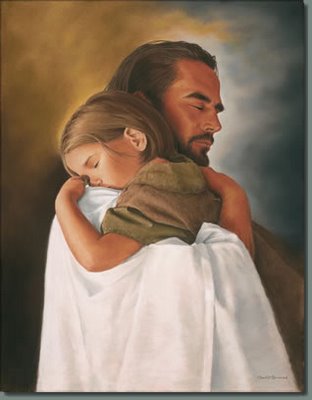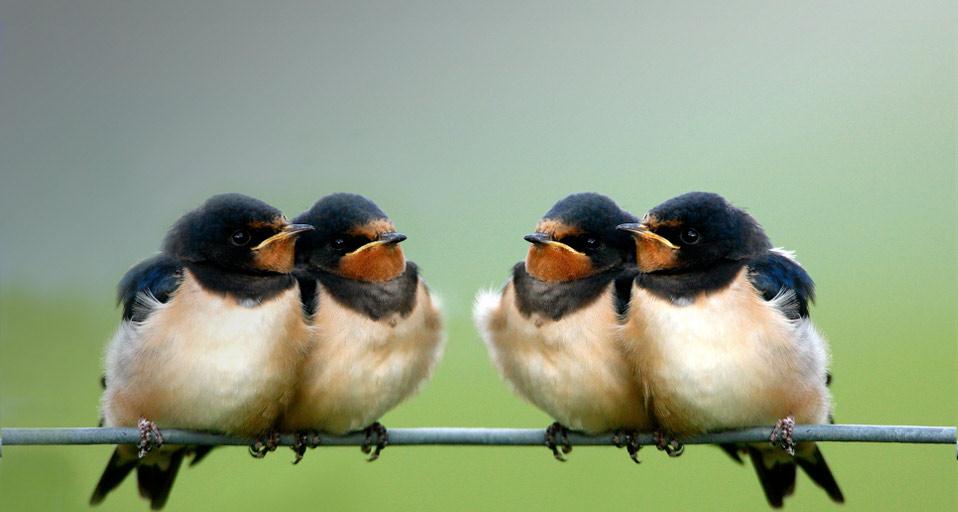
Cuddly



Cuddly Twins
We drove over to the school ground and took Elder Haskell and his wife. . . . The two boys did not view the scenery much, for they went fast to sleep, and did not waken till the carriage stopped at Morisset. Then Henry woke. I set him between Elder Haskell and me. He looked up at Elder Haskell, and his under lip was thrown out until it was quite prominent. Then he looked at his grandmother, cuddled himself down, and went to sleep again. and slept until we arrived at home. . . .
The boys are hearty fellows. I think it will cost you something to feed them. They are full of life. They can take a few steps now, and are in good health. Today Herbert put his finger in Henry's mouth, and Henry bit it. Oh, how Herbert did cry! For some time he would not look at Henry without crying. But they seldom cry when they hurt themselves.
Wednesday, June 30, 1897. . . . We rode to the post office. The twins, Herbert and James Henry, saw the horse and wagon at the door and both came running to their grandmother with their little arms outstretched, full of expectation that I would take them. I could not have the heart to disappoint them. Their wraps were thrown on and Sara cared for one and I for the other, and then they were perfectly happy, having a hold of the end of the lines and supposing they were driving.
We returned to my home, about three quarters of a mile, took the two babies, Henry and Herbert White, and Sara and I rode in the country about five miles to Martinsville to purchase corn. We went to Mr. Smith's. We had a very pleasant visit with his wife and his daughter. They were very much delighted to see the twins trotting over the oilcloth floor. Mr. Smith had no corn to sell. We then started on our return to Martinsville and found one of the Martins family had corn so we were favored. We purchased two bushels, and bought of them twenty dozen oranges. . . .
They carried the twins to the new house, into larger rooms. I never saw children fifteen months old act as these children did. They would run and laugh and hop and jump and kept up this trotting and running for hours. They acted as if they thought the house was built for their playhouse.
Monday, August 16, 1897. Sara and I went to Martinsville and Brother Rodd accompanied us. May White and her twin boys went with us and they had a picnic handling the oranges. The piles of bright yellow fruit were very attractive to the little lads. We had a very pleasant drive and when we returned we called for the mail and had quite a large mail to examine. We always take a deep interest in the arrival of mail on the steamer from America.--Ms 175, 1897, p. 12. (Diary, August, 1897.)
Tuesday, May 10, 1898. . . . Sara and I rode out about two miles to a lemon orchard. . . . We obtained the native lemons for two pence a dozen--four cents in American money. While they were gathering the lemons the twins, James Henry and Herbert, now twenty-five months hold, were very much pleased gathering the lemons and piling them up in heaps and with their unintelligible language showing them to Grandma. . . .
Friday, May 20, 1898. Sara and I went to Morisset. We mailed our letters at Cooranbong. We took the twins with us. They are very interesting little fellows, chattering to the birds and to the logging bullock teams which we met and which we passed. . . . I had risen early in the morning to get off letters for the office and was very thankful to keep out in the open air. . . . The work that needs to be done is to open the way that children may take in the fact that Jesus loves them and will be greatly pleased if they will love Him and give their young hearts to Him. Parents and children should be united in their willing service to God.
Monday, June 27, 1898. . . . Sara and I rode out about two and a half miles to purchase lemons. We took the twins with us. . . . We backed our platform wagon under the trees and then Sara could stand up in the wagon and pick the lemons, so it was not taxing to her. The two-year-and-half twins enjoyed this very much, but their hands were not strong enough to pull the lemons from their firm fastening. Sara pulled fruit for them.
These are dear little fellows. We hope that they will be kept in health and that they will be the Lord's dedicated to Him daily. I love to think the Lord Jesus loved little children and blessed little children.
Friday, July 15, 1898. . . . Rode down to post office. Took the twin children with us. They enjoyed the ride very much. We rode some little time on a new road, but it was rough.
Monday, August 15, 1898. . . . We rode about six miles, taking the twins along. . . . We took lunch and sat out in the open air to eat our lunch. Mrs. Pringle sent us a few oranges when her husband came from the field where he had been at work. He invited us into his house, but we preferred being out of doors. . . .
Sunday, August 21, 1898. . . . Minnie and the babes and I went on our way to find the first station after leaving Morisset. The roads were exceedingly rough. We feared the horses would be swamped. The corduroy roads were very bad. The smooth round poles put in, and almost entirely uncovered, were a dangerous matter.
Sunday, September 4, 1898. Willie, May, the children--Mabel and the twins,--went with me to the workers' railroad builders' camp. I spoke to about one dozen women. The men kept afar off.
May is well; the boys also are in good health. I have carried them each a peach at their meals for the last three days. They enjoy them very much, and smack their lips as if they took great satisfaction in eating them.
Ella May White, Grandma would be very much pleased could she see you this morning. I was very sorry to hear that you fell down the stairs. Was it the long back stairs or the short stairs? I think one of the good angels of the Lord was close by you to prevent your falling and breaking your limbs or killing you. These good angels are watching over you, else you might get into many difficulties.
Remember that the Lord loves you and you please the dear Saviour when you are gentle and kind and obedient, and if you are pleasant and have a beautiful character Jesus will, when He comes, give you a beautiful harp that you can play upon. He will give you a crown of gold and you will be very happy always. You will never fall downstairs, never be sick, but be happy. Try hard every day to be a good, sweet-dispositioned little girl.
5MR 190

Leaning On Jesus
Beloved Disciple
“We love him, because he first loved us.”
1 John 4:19.
"John is distinguished above the other apostles as "the disciple whom Jesus loved" (John 21:20). . . . He received many tokens of the Saviour's confidence and love. He was one of the three permitted to witness Christ's glory upon the mount of transfiguration and His agony in Gethsemane, and it was to his care that our Lord confided His mother in those last hours of anguish upon the cross.
John's was a nature that longed for love, for sympathy and companionship. He pressed close to Jesus, sat by His side, leaned upon His breast. As a flower the sun and dew, so did he drink in the divine light and life.
The depth and fervor of John's affection for his Master was not the cause of Christ's love for him, but the effect of that love. John desired to become like Jesus, and under the transforming influence of the love of Christ he did become meek and lowly. Self was hid in Jesus. Above all his companions, John yielded himself to the power of that wondrous life. . . . John knew the Saviour by an experimental knowledge. His Master's lessons were graven on his soul. When he testified of the Saviour's grace, his simple language was eloquent with the love that pervaded his whole being.
It was John's deep love for Christ, which led him always to desire to be close by His side. The Saviour loved all the Twelve, but John's was the most receptive spirit. He was younger than the others, and with more of the child's confiding trust he opened his heart to Jesus. Thus he came more into sympathy with Christ, and through him the Saviour's deepest spiritual teaching was communicated to the people. . . .
John could talk of the Father's love as no other of the disciples could. He revealed to his fellow men that which he felt in his own soul, representing in his character the attributes of God. . . . The beauty of holiness which had transformed him shone with a Christlike radiance from his countenance. In adoration and love he beheld the Saviour until likeness to Christ and fellowship with Him became his one desire, and in his character was reflected the character of his Master.”
CC 315

“The Birds"
"The winter is past, the rain is over and gone; the flowers appear on the earth; and the time of the singing of birds is come." What a sweet, bright, joyous time is the Spring-time, is it not? The very air seems to be full of the new life that is to be seen everywhere.
The birds feel it, and after feebly chirping and twittering through the cold, dark months of winter, they join in the general rejoicing and burst out in the Spring-time into full, sweet song, and so help to make this the happy season that it is.
How busy they are, too; for this is a most important time for them. Of what, do you suppose, are they thinking, as they sing so merrily while they are busy gathering the materials for their nests, and skillfully weaving them together in the way that God has taught them to do?
These nests are not for themselves; the birds do not build nests for a home and shelter for themselves. They are thinking lovingly of the treasure that the pretty warm nest will soon hold the precious eggs, which, if all goes well, will hatch into dear little baby birds, to be fed, and cuddled under their wings.”
March 23, 1899 EJW, PTUK 186
“Did you ever look into a little bird's nest when the baby birds were just out of the shell? What a surprise it was to see their little naked bodies! No soft down, no pretty feathers. How helpless these tiny creatures are. They cannot even stand, for there is no strength in their legs. All they can do is to cry for food, and swallow what the busy little Mother-bird brings. This is just how you were when you came into the world, a tiny, bald-headed, helpless baby. You lay all day in your little cradle nest, or in your Mother's arms. You could only cry for food and swallow what was given you by your loving Mother, without even saying "Thank-you."
Does the Mother-bird mind all her trouble? Would she rather be without all this care and hard work? Oh, no; she loves these ugly little fledglings, and thinks they are beautiful. All day long she thinks of them, and is never so happy as when they are cuddled under her warm, soft wings.
And did your mother think it was a trouble to work for you and care for you when you were a helpless little baby? No; all her work was sweet because she loved you so much. Do you not love her dearly for all her kind care? What can you now do to show your love? You can be a good, obedient, happy child.”
Waggoner
May 21, 1903 EJW, PTUK 331

